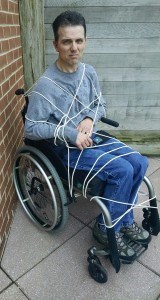Lately I have seen many more headlines in newspapers, magazines, websites, and just media in general, referring to a person who uses a wheelchair as “wheelchair bound.” This annoys me to no end because the chances are pretty slim that the person was actually “bound” to a wheelchair. According to Merriam-Webster, the adjectival definition of bound is “fastened by or as if by a band: confined.”
I really don’t believe that every person who uses the term “wheelchair-bound” or says somebody is “bound to their wheelchair,” is trying to denigrate the individual who uses the wheelchair. However, that is not an excuse for using the terminology. It may have been acceptable at one time, but times change and so do acceptable words and phrases.
To say someone is “wheelchair-bound” is to perpetuate an unfortunately popular misconception that someone’s wheelchair is the most prominent and important aspect of that person. It’s as if the person who uses the wheelchair is not really a person, but rather some type of machine. Of course, there are implantable technologies that can make a person feel like a cyborg (which is a positive thing for this sci-fi geek who has a cochlear implant!), however, to be referred to as a machine is inappropriate.
The definition I quoted in the first paragraph uses the word “confined.” A wheelchair does pretty much the opposite for those of us who use them; they enable us and they are extremely liberating devices. When I hear someone described as “wheelchair-bound” or “confined to a wheelchair,” I always think of a way that one of my sisters described my wife, Sheri: “When she is in her chair, she is a whirlwind!”
I think it’s important to not just scold journalists who use “wheelchair-bound” (or some semblance thereof) but to also reach out to those who have an opportunity to use it, but don’t — they should to be thanked for their respect.
We just passed the 25th anniversary of the Americans with Disabilities Act, and there was celebration and recognition of the positive changes that have been made in physical access and other accommodations for individuals with disabilities. And there certainly have been many positive changes, however, if antiquated and quite frankly demeaning terminology like “wheelchair-bound” does not change, then I hesitate to recognize the fact that we have made progress since passage of the ADA. Please, this is not just a matter of getting exercised over simple semantics. How would you feel if someone described you as “bound?” Words matter. And they can hurt.
Tony Trott is 46 years old and resides in Arlington, Va. He has Friedreich¹s Ataxia. He and his wife run a business called Happy on Wheels and would love to connect with you on Facebook and Twitter (links on website).
Support New MobilityWait! Before you wander off to other parts of the internet, please consider supporting New Mobility. For more than three decades, New Mobility has published groundbreaking content for active wheelchair users. We share practical advice from wheelchair users across the country, review life-changing technology and demand equity in healthcare, travel and all facets of life. But none of this is cheap, easy or profitable. Your support helps us give wheelchair users the resources to build a fulfilling life. |



i have been thinking/saying this for a long time. what is the alternative? i use “wheeler,” or “wheelchair driver,” but i wonder what other terms fellow wheelers use? i agree, i am not bound to my chair, and find the term demeaning.
I’ve been in a chair for 23 years and I am now 52 years old. I see no problem with wheelchair bound, Cripple, Disabled, Handicapped, physically challenged and have never had a problem. But now people want to be called physically able. They all mean the same thing your stuck using a chair from time to time or in my case 14 to 18 hours a day. People need to stop whining so darn much.
The author might like to consider that their impression of what other people are thinking might not be accurate.
I doubt anybody has ever used the term “wheelchair bound” in the sense “tied into the wheelchair”, implicitly or explicitly. Context matters. If somebody says “I could kill for a beer right now” there is 0 probability that the actual act of murder is running through their mind. If somebody makes a mistake and exclaims “sh*t!” it is highly unlikely that they are actually thinking about faeces in any way. Just because you can find a definition in the dictionary, does not mean you can slather it everywhere without consideration of context.
Some people might wrongly consider somebody’s wheelchair use as a defining aspect of that person but I can assure you that this isn’t exacerbated by the use of the phrase “wheelchair bound”.
The phrase “wheelchair bound” means “physically unable to get out of a wheelchair”, no more and no less. Which is a not only a perfectly accurate description, but also in many instances a useful one too. It should go without saying that nobody should be demeaned or in any way considered a second hand citizen for using a wheelchair. But nonetheless issues with discrimination will not be solved by censoring language suggestive of a simple reality.
I understand the sensitivity to current semantics, what to use as an alternative please?
Person using a wheelchair, but I love “wheeler” or “wheelchair driver/driver” if its ok. I guess we use the person’s name or ask if we have the chance to